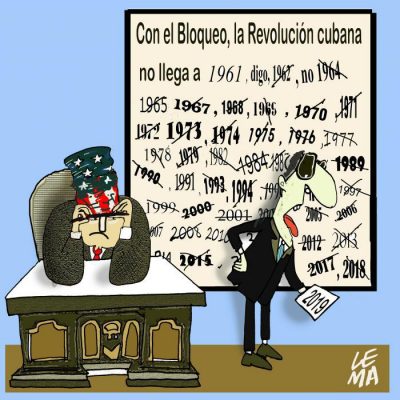Cuba: A U.S. Obsession

The Trump administration has closed the U.S. Citizenship and Immigration Services office in Havana, as of December 10, requiring Cubans to travel to the office in Mexico City to acquire visas to the U.S.
Cuba has, for years now, been a recurrent theme on the agenda of the many U.S. administrations that have passed through the White House. The same phrases are repeated and the rhetoric is the same, and while bilateral relations had improved briefly, the Trump government has done away with that progress, almost entirely.
One of the latest moves took place on International Human Rights Day, which Secretary of State Mike Pompeo “celebrated” by announcing that he had sent a letter to Cuban Foreign Minister Bruno Rodríguez – that reached the press before its recipient – in which he expresses his “concern” for human rights in Cuba.
Despite the fact that Cuba’s commitment to human rights has been demonstrated time and time again, and noted by representatives of multilateral organizations who have visited the island, U.S. attacks have not ceased. Immediately after the Pompeo letter was published, many Cuban figures and leaders responded through various media:
The President of Cuba’s Councils of State and Ministers, Miguel Díaz-Canel Bermúdez, tweeted,
“The U.S. has no moral authority to talk about human rights; its discourse is hypocritical, dishonest, and reflects double standards. Does anyone know of a more cruel violation of human rights than the economic, commercial and financial blockade of Cuba?”
Also on Twitter, Foreign Minister Bruno Rodríguez addressed Pompeo, demanding:
“Lift the blockade. Reestablish the issuing of visas for Cubans. Stop the repression of immigrants, minorities, and the poor.”
Likewise, the Foreign Ministry’s General Director for the United States Carlos Fernández de Cossío stated,
“If the United States were truly interested in the human rights of Cubans, it would not impose a criminal economic blockade that punishes the entire country, nor create more obstacles to orderly emigration and consular services, on which tens of thousands of Cubans depend.”
Fernández de Cossío was referring to the Trump administration’s decision to close the U.S. Citizenship and Immigration Services (USCIS) office in Havana, as of December 10, requiring Cubans to make the journey to the USCIS office in Mexico City, which has assumed jurisdiction over immigration and travel to the United States previously addressed here.
It should be recalled that as of November last year, the majority of USCIS services in Cuba were transferred to U.S. consulates in other countries, but now, with the closure of the office in Havana, permanent residents in that country will be also affected. If while in Cuba, they lose their “green card” which serves as a re-entry permit to the United States, these individuals are obliged to rearrange their papers elsewhere.The decision will also affect the Family Reunification Program.
*
Note to readers: please click the share buttons above. Forward this article to your email lists. Crosspost on your blog site, internet forums. etc.
Featured image is from Lema

